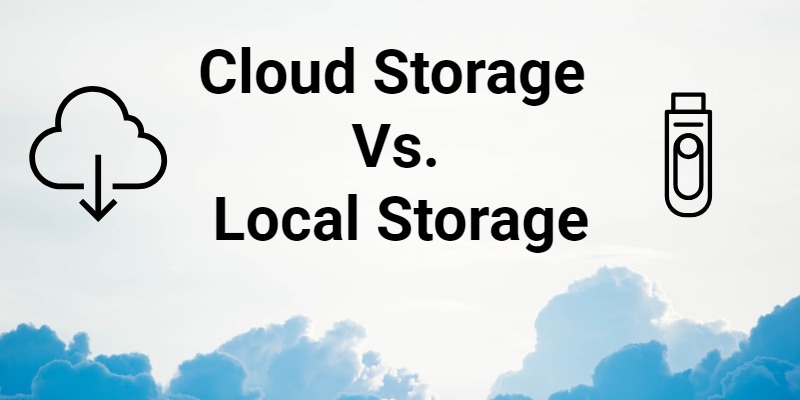
Cloud Storage Vs. Local Storage: What’s The Right Choice For You
In the age of digital data, we’re constantly faced with the dilemma of where to store our ever-expanding troves of information. For years, local storage solutions like hard drives and solid-state drives (SSDs) have been the go-to choice. However, the landscape has evolved with the rise of cloud storage services, and users now have a powerful alternative. In this blog, we’ll explore the pros and cons of cloud and local storage and help you decide which option is right for you. To explore more about cloud storage, consult with IT Consulting Los Angeles experts.
Understanding Cloud Storage
Cloud storage is a relatively new but rapidly growing technology. It involves storing your data on remote servers you access online. Companies like Google, Amazon, Microsoft, and Dropbox offer cloud storage services, allowing users to upload and access their files from anywhere with an internet connection.
Advantages of Cloud Storage
Accessibility: One of the most significant advantages of cloud storage is accessibility. Your files are not tied to a specific device. You can access them from your laptop, smartphone, or even a public computer, provided you have internet access.
Scalability: Cloud storage services usually offer tiered pricing plans that can be adjusted based on your needs. You can start with small storage and expand it as your requirements grow. This flexibility is ideal for individuals and businesses alike.
Data Redundancy: Most reputable cloud storage providers maintain multiple copies of your data in geographically distributed data centers. This redundancy ensures that your data is safe even if one server fails.
Automatic Backups: Many cloud storage services offer automatic backup solutions, saving you from the hassle of manual backups. This is a crucial feature for those who often forget to back up their data.
Collaboration: Cloud storage is perfect for collaborative work. You can easily share files and folders with colleagues or friends, and multiple people can simultaneously work on the same document. This is a massive benefit for businesses and remote teams.
Security: Reputable cloud storage providers invest heavily in security measures. They employ encryption to protect your data during transmission and while it’s stored on their servers. This level of security can be challenging to replicate with local storage solutions.
Disaster Recovery: In a hardware failure, theft, or natural disaster, your data remains safe in the cloud. This is a significant advantage over local storage, where a catastrophic event can result in data loss.
Disadvantages of Cloud Storage
Dependency on Internet Connection: Accessing your data in the cloud relies on an Internet connection. This can be frustrating if you’re in an area with slow or unreliable internet.
Privacy Concerns: Storing sensitive information in the cloud may raise privacy concerns. While reputable providers have robust security measures in place, there’s always a risk of data breaches.
Subscription Costs: While many cloud storage providers offer free plans with limited storage, you’ll need to pay for more significant amounts of storage. This can add up over time, making it a recurring cost.
Limited Control: With cloud storage, you have limited control over your data. You’re entrusting it to a third party, which means you’re subject to their terms and conditions.
Understanding Local Storage
Local storage, as the name suggests, involves storing your data on your own physical devices. These can be internal or external hard drives, SSDs, USB drives, or optical media like DVDs.
Pros of Local Storage
Data Control: When you store your data locally, you have complete control over it. You decide where and how it’s stored, and don’t rely on a third party.
No Subscription Costs: Local storage is a one-time investment. Once you purchase the hardware, there are no recurring subscription fees. This makes it a cost-effective choice in the long run.
Faster Access: Accessing data from local storage is typically quicker than retrieving it from the cloud, especially if you have a high-quality SSD.
No Internet Dependency: Local storage doesn’t require an internet connection. You can access your data anytime, anywhere, without worrying about network availability.
Privacy: Your data is not subject to third-party terms and conditions or potential data breaches, which can provide peace of mind for those concerned about privacy.
Cons of Local Storage
Limited Accessibility: The major downside of local storage is limited accessibility. Your data is tied to the device it’s stored on, making it less convenient for users who need to access their data from multiple locations.
Risk of Data Loss: Local storage solutions are susceptible to hardware failures and physical damage. If your hard drive crashes or your device is stolen, your data may be lost forever unless you’ve backed it up elsewhere.
Limited Scalability: Adding more storage to a local device can be cumbersome and expensive. You may need to purchase additional hardware; transferring data can be time-consuming.
Manual Backups: Backing up your data with local storage is manual. If you forget to do it regularly, you risk losing your most recent data in the event of a failure.
How to Choose Between Cloud and Local Storage
The decision between cloud and local storage largely depends on your specific needs and preferences. Here are some factors to consider when making your choice:
Data Usage: Consider how much data you need to store. If you have a massive amount of data, cloud storage may be the more practical option, as it’s easy to scale up.
Accessibility: Think about how you plan to access your data. Cloud storage is the clear winner if you need to access it from multiple devices or locations.
Privacy and Security: Evaluate the sensitivity of your data. Local storage may be more suitable if you’re concerned about privacy and security, especially for sensitive documents or personal information.
Cost: Compare the long-term costs of cloud storage subscriptions to the one-time investment in local storage. This may help you decide which option is more cost-effective for your situation.
Backup Habits: Consider your diligence in performing backups. If you’re forgetful or have little time to manage backups, cloud storage’s automatic backup features can be a lifesaver.
Collaboration Needs: If you collaborate with others or work in a team, cloud storage is the better choice due to its easy file-sharing and real-time collaboration features.
Redundancy and Disaster Recovery: If you live in an area prone to natural disasters or want an extra layer of protection against data loss, cloud storage’s redundancy and disaster recovery capabilities are worth considering.
Conclusion
There is no one-size-fits-all answer in the debate of cloud storage vs. local storage. The right choice depends on your specific needs and preferences. Both options have advantages and disadvantages, so consider factors like data usage, accessibility, privacy, cost, backup habits, collaboration needs, and disaster recovery.
Ultimately, you may find that combining cloud and local storage offers your data the most flexibility and security. Regardless of your decision, remember to prioritize data security and regularly back up your important information to ensure it’s always accessible and protected. If you want to choose the right option for your business, visit IT Support Los Angeles for assistance.








